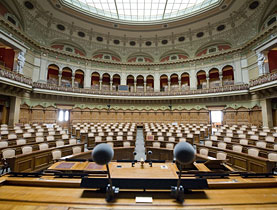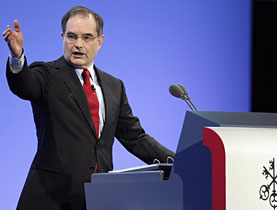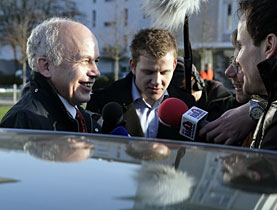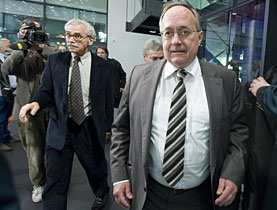UBS and cabinet election top parliament agenda

As parliament assembles in its newly renovated building, the main agenda item is the bailout for beleaguered Swiss bank UBS and the fallout from the financial crisis.
Another major event during the three-week winter session, which opens on Monday, will be the election of a replacement for Defence Minister Samuel Schmid.
In a special session, parliamentarians will consider a $60 billion (SFr68 billion) government bailout given to the country’s largest bank, UBS, in October, after it racked up $44 billion of subprime mortgage losses.
The rescue package is likely to prompt a lot of debate, even though parliament cannot change the deal. The centre-left’s calls for bankers’ high bonuses to be capped are unlikely to be heeded.
UBS has already reacted to pressure over its bonus system. At the end of November former UBS chairman Marcel Ospel and two other directors said they would waive payouts worth a total of SFr33 million.
This follows on from UBS’s announcement that it would install a more transparent pay system.
Parliament will also discuss the government’s proposal to increase guarantees for bank deposits more than threefold to SFr100,000 from the current limit of SFr30,000.
Then the federal budget has to be approved. The government wants to increase it by SFr340 million to SFr58.56 billion in 2009 to stave off the current financial crisis and a looming recession.
But not all political parties agree with the move or think that the government is doing enough.
The SFr917-million army funding package pushed by Schmid faces its final hurdle in the House of Representatives – after being rejected in the autumn session. Observers say that it is likely to be passed as a “leaving present” for the outgoing defence minister.
Schmid bows out
Schmid, who had been under pressure over his handling of his ministry and the appointment of a chief commander of the armed forces, announced his resignation in November, for family and health reasons.
Parliament will decide who fills the vacancy in the seven-member, multiparty cabinet on December 10.
The rightwing Swiss People’s Party – the strongest in parliament – is gunning for the job. It has no minister since parliament refused to re-elect its leading light Christoph Blocher to the cabinet a year ago.
Blocher was replaced by the current Justice Minister Eveline Widmer-Schlumpf. Snubbed by the People’s Party, both she and Schmid subsequently joined a new breakaway party called the Conservative Democrats.
But Blocher refuses to fade away and is now one of the People’s Party nominees for the cabinet post. The other is the equally hardline former party president Ueli Maurer.
Also in the running is a candidate from the Greens – Switzerland’s fifth largest party.
Maurer is the clear favourite to be elected to the cabinet, as the three main political parties announced they would not vote for Blocher.
Already confirmed on Monday by both houses are the parliamentary speakers for the next 12 months.
The House of Representatives has elected Chiara Simoneschi-Cortesi – from the Italian-speaking canton of Ticino – to head the 200-strong chamber, and the 46-member Senate has opted for Alain Berset, a 36-year-old representative from Fribourg.
These posts are also shared among the main political parties according to a rotating system.
Merz for president
Other elections should go more smoothly. As every year, parliament has to approve the positions of president and vice president, which are traditionally rotated around the cabinet.
Finance Minister Hans-Rudolf Merz, who has recently recovered from a quintuple heart bypass operation, is up for president and Economics Minister Doris Leuthard for the deputy post in 2009.
swissinfo, Isobel Leybold-Johnson
The Swiss parliament is made up of two houses: the House of Representatives and the Senate, which have the same powers. Decisions must be approved by both chambers to be valid.
On average, parliamentarians devote around 60% of their working hours to their parliamentary duties; most also have a career outside parliament.
Parliament sits for four seasonal sessions. The 2008 winter session will end on December 19.
Parliamentarians will meet for the first time in the new look parliament building, which has undergone a SFr103 million ($85.5 million) renovation. The original edifice is more than 100 years old.

In compliance with the JTI standards
More: SWI swissinfo.ch certified by the Journalism Trust Initiative




You can find an overview of ongoing debates with our journalists here. Please join us!
If you want to start a conversation about a topic raised in this article or want to report factual errors, email us at english@swissinfo.ch.